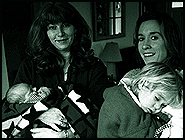 | ||
Justy Delivers SUMNER MADE HIS EXTRAORDINARY ENTRANCE to this world ten weeks early. Justy delivered him in December, with Sumner's parents, Catherine and David, arriving at the hospital just minutes before he slipped out.
Justy and Catherine remember the frenetic night Sumner was born, December 14, 1997. Justy carried and delivered the baby for Catherine, the boy's genetic mother. Justy laughs at the memory. Because Sumner was so early, she hadn't the time to explain her situation to the nurses. "When the baby came they started handing it to me and I said, 'No, give it to the mother, give it to the mother!' But Catherine had this velvet dress on because she came from a Christmas party," Justy says. Because his premature lungs were under-developed, Sumner spent ten days in the hospital before he was strong enough to go home. In her suburban Philadelphia living room, Catherine cuddles the snoozing boy in a fleece blanket while his two-year-old sister, Emma, gleefully spreads her toys across the room. Catherine had Emma the conventional way, but severe complications with the birth nearly killed Catherine. When she recovered her ovaries still functioned, but she is unable to carry another child. So Catherine, a bond trader, and her husband David, a software salesman, signed up with the gestational carrier program at Pennsylvania Reproductive Associates. Catherine and David are deeply pleased that Sumner is their genetic child. Catherine says they might have adopted, but she's happier knowing her son's family medical history and sharing a genetic heritage with him. "This worked out perfectly," Catherine says. "I have this baby here who looks just like my daughter, and I feel very lucky." When they explain to others how Sumner was born, David and Catherine stress that their son was delivered by a gestational carrier, not a surrogate mother. Catherine says birth is not the marker of motherhood. "A mother is somebody who takes a child from birth and raises them," Catherine says. "I'm the one who's taken care of him since he was a second old."
Catherine, a Philadelphia mother of two whose second
child was born through gestational surrogacy, answers those critics who say surrogacy is an unethical use of technology. On a winter afternoon, Justy and Mike drop by Catherine's house to visit, as they often do now. It is Mike who cradles Sumner, teasing a pacifier into his fussing mouth. Justy sits across the room next to Catherine, content to watch the baby from afar.
"I'm here to see Catherine, actually. I mean it's nice to see the baby when I come in, but it's more just out of the friendship that we've developed," Justy says. The two couples are so close they've even vacationed together. Catherine says while Justy is sure to be a permanent family friend, she and her husband probably won't tell Sumner how he was born until he's a teenager. Catherine is unworried about how he'll take it. "When this child is old enough to understand something like that, I can't imagine how people are going to be having babies," Catherine says. She'll tell Sumner that they loved Emma so much, they wanted more of that love in their family. "Because we went through so much just to be able to accomplish that, I think it will make him feel more special and more wanted than your average child," Catherine says. The surrogacy, the lawyers, and the medical bills cost Catherine and David more than $40,000. But if the couple can manage it, they might try for a third child. Justy's ready to carry the baby. |

